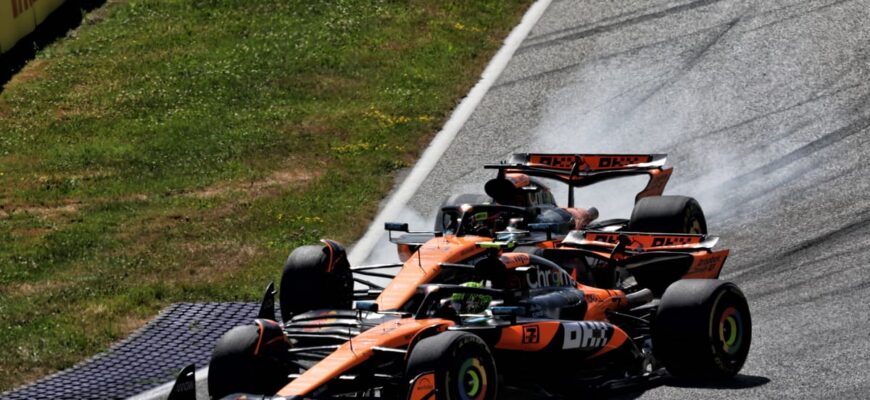McLaren plans to continue allowing their drivers, Oscar Piastri and Lando Norris, to compete against each other without team orders, even after their crash during the Canadian Grand Prix. However, the team acknowledges that the incident highlighted the need for drivers to exercise greater “caution” when racing closely.
The collision occurred in the final laps in Montreal as the two drivers, who are strong contenders for the title, were fighting for fourth place. Norris was behind Piastri and made contact. He quickly diffused the situation by accepting responsibility and apologizing to Piastri and the team.
Following the race, Team Principal Andrea Stella indicated that while there would be “serious” discussions at the factory before the upcoming Austrian Grand Prix, the crash would not alter their racing philosophy or the agreed-upon “papaya rules” for driver conduct on track.
Stella stated that allowing drivers to race freely and clearly understanding the racing rules are fundamental team values they want to uphold as much as possible. He believes constant control from the pit wall whenever cars are near each other would detract from the essence of racing.
He elaborated that excessive team control could turn racing into something artificial. McLaren wants to ensure Lando and Oscar`s final standings reflect their skill, performance, and racing quality throughout the season, rather than being dictated by team management of points. Stella admitted this approach isn`t always simple but is something they strive to perfect.
He added that the Canada incident is unlikely to change their overall approach. Instead, he feels it will reinforce and strengthen their existing principles, specifically requiring drivers to be more cautious. He explained that if the rule is “no contact,” drivers must leave sufficient space, especially in situations like using DRS where the following car can be pulled closer, potentially leading to misjudgments of distance.
The Need for Better Judgment
Given McLaren`s strong performance this season, resulting in Piastri and Norris frequently racing at the front in the first ten rounds, team management had anticipated a potential clash between the pair eventually.
Now that the first such incident has happened, Stella is confident that McLaren`s “robust culture” will help both the team and drivers learn from the Canada events and become stronger. He described how situations that seem like disasters in the moment are processed within a strong racing culture. The team and drivers will review what happened, extract positive lessons, and discard anything unhelpful for future racing.
This proactive mindset is shared throughout McLaren, Stella noted, exemplified by how Lando handled his role in the incident. These kinds of discussions will involve not just the drivers but the entire team. Stella emphasized that they rely on their strong culture to analyze these episodes calmly after the heat of the moment, allowing the team and drivers to emerge stronger.
He accepted that close racing between the two McLarens will inevitably occur again. Stella concluded that experiencing the Canada situation should make the team and drivers more resilient in such scenarios, requiring improved judgment regarding distance when racing wheel-to-wheel.
The retirement in Canada meant Norris fell 22 points behind points leader Piastri heading into the upcoming double-header in Austria and Britain. Despite finishing off the podium for the first time this season in Canada, McLaren still holds a significant lead in the Constructors` Championship, 175 points ahead of Mercedes.









